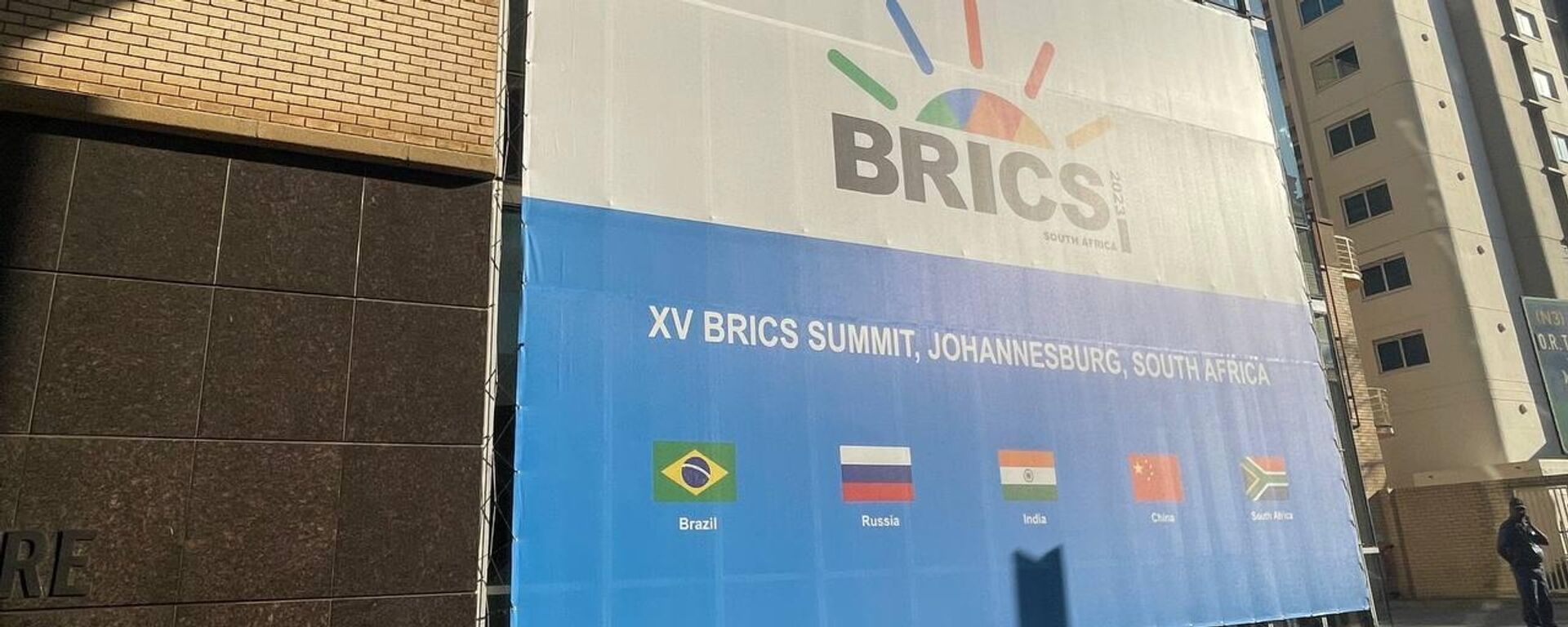https://en.sputniknews.africa/20230822/us-exerts-pressure-on-south-africa-over-its-non-aligned-stance-multilateralism-is-needed-expert-1061519300.html
US Exerts Pressure on South Africa Over Non-Aligned Stance: Expert
US Exerts Pressure on South Africa Over Non-Aligned Stance: Expert
Sputnik Africa
On August 20 ahead of the 15th BRICS Summit, South Africa's President Cyril Ramaphosa made a speech touching upon the BRICS group's role for his country. 22.08.2023, Sputnik Africa
2023-08-22T13:16+0200
2023-08-22T13:16+0200
2023-08-22T14:56+0200
2023 brics summit in johannesburg
southern africa
south africa
brics
brics summit
brics expansion
cyril ramaphosa
president
multipolarity
ukraine crisis
https://cdn1.img.sputniknews.africa/img/07e7/08/16/1061523164_0:126:3197:1924_1920x0_80_0_0_996ef82eb8e046093cc546ef114771ea.jpg
The United States are applying pressure towards South Africa due to the latter's non-aligned position on the world arena and, in particular, in connection to the Ukraine crisis, Dr. Tafadzwa Ruzive, PhD in development finance from the Nelson Mandela University and an international finance expert, told Sputnik Africa.Moreover, according to the expert, Western nations utilize volatile portfolio flows, that affect the country’s national currency rand, prompting South Africa to look for more reliable investment sources.Thus, the expert outlined that the nation may benefit from multilateralism, as many problems can be solved even without "total alignment" regarding ideology.In this regard, Ruzive stressed that cooperation with BRICS will give South Africa many possibilities in terms of various projects’ financing within the group’s framework.The expert stressed that the ongoing BRICS Summit may adopt new criteria for the global multidimensional order development.According to him, Algeria and Egypt are the African nations most likely to become the bloc's new members.
https://en.sputniknews.africa/20230822/brics-lead-debate-on-fixing-global-financial-system-formal-decisions-expected-at-summit-academic-1061516869.html
southern africa
south africa
united states (us)
Sputnik Africa
feedback@sputniknews.com
+74956456601
MIA „Rossiya Segodnya“
2023
News
en_EN
Sputnik Africa
feedback@sputniknews.com
+74956456601
MIA „Rossiya Segodnya“
Sputnik Africa
feedback@sputniknews.com
+74956456601
MIA „Rossiya Segodnya“
southern africa, south africa, brics, brics summit, brics expansion, cyril ramaphosa, president, multipolarity, ukraine crisis, united states (us)
southern africa, south africa, brics, brics summit, brics expansion, cyril ramaphosa, president, multipolarity, ukraine crisis, united states (us)
US Exerts Pressure on South Africa Over Non-Aligned Stance: Expert
13:16 22.08.2023 (Updated: 14:56 22.08.2023) On August 20 ahead of the 15th BRICS Summit, South Africa's President Cyril Ramaphosa made a speech touching upon the BRICS group's role for his country.
The United States are applying pressure towards South Africa due to the latter's
non-aligned position on the world arena and, in particular, in connection to the Ukraine crisis,
Dr. Tafadzwa Ruzive, PhD in development finance from the Nelson Mandela University and an international finance expert, told
Sputnik Africa.
"Pretoria has been negatively affected by maintaining the policy of non-alignment as the US is applying pressure to take a side on issues on the war in Ukraine. The relationship has markedly deteriorated. This is shown by measures taken by the US to sanction South Africa in these areas. Economically, the exchange rate has depreciated beyond R19/USD and has had difficulty strengthening beyond that point. […] Yet to be substantiated allegations that South Africa supplies weapons on the war in Ukraine also show the diplomatic demotion that the USA is inflicting on South Africa," the expert stated.
Moreover, according to the expert, Western nations utilize volatile portfolio flows, that affect the country’s national currency rand, prompting South Africa to look for more reliable investment sources.
"Volatile portfolio flows negatively affect the South African rand, making imports more expensive, as well as hampering investment through creating uncertainty. This has been used as a tool by Western financial institutions to control the development narrative, as policies that differ from Western interest are sanctioned by the quick withdrawal of capital from SA’s financial markets. By moving to more reliable capital and investment flows, SA can pursue its own economic development trajectory without fear of sanction from Western financial institutions, strengthening national sovereignty," he further noted.
Thus, the expert outlined that the nation may benefit from multilateralism, as many problems can be solved even without "total alignment" regarding ideology.
"Multilateralism is beneficial in that it allows states to pursue their political and economic development agendas without fear of retribution from power blocs. Multilateralism has the advantage that it enables solutions to pertinent global issues to be developed, even though there might not be total alignment in ideological positions. There are global challenges that are too important to subject to action only after ideological agreement has been reached. As such, it is beneficial for multilateralism to be adopted as the foundation of an equitable global order, he noted."
In this regard, Ruzive stressed that cooperation with BRICS will give South Africa many possibilities in terms of various projects’ financing within the group’s framework.
"Cooperation with BRICS will create opportunities for more financing of South African projects under BRICS initiatives," the expert said. "Lines of credit from other BRICS nations are going to provide South Africa with much-needed loans to finance development projects such as infrastructure, energy and skills development. Finance from BRICS partners could be invested with few conditions and at interest rates conducive for development."
The expert stressed that the ongoing
BRICS Summit may adopt new criteria for the global multidimensional order development.
"This summit could lay down the criteria for the development of a global multilateral order, if not reveal it by accepting further members into the BRICS grouping. The first action would send a signal to the existing global order that there are alternative worldviews on which to establish global relations. The second action would lay the foundation for the realization of a new, fairer global order," Ruzive stated.
According to him, Algeria and Egypt are the African nations most likely to become the bloc's new members.
"Algeria and Egypt are frontrunners to join BRICS. In the criteria, economic size and political influence will feature greatly. Geopolitical strategic considerations could also come to the fore i.e., Egypt at the Suez Canal and Algeria by the Strait of Gibraltar, controlling these key trade routes could provide BRICS+ with added flexibility in conducting international trade. Security issues will also feature prominently as criteria for joining the BRICS," Ruzive said.



